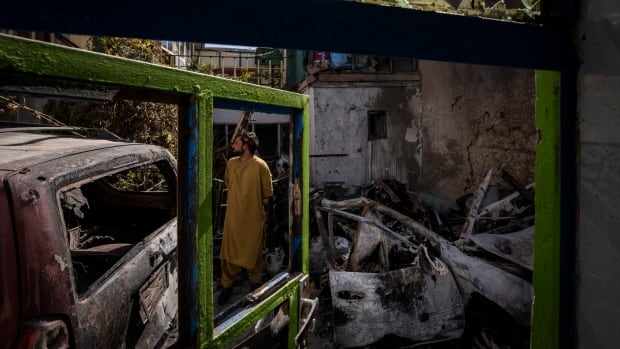The U.S. drone strike that killed Afghan civilians will go unpunished, officials say
[ad_1]
No U.S. troops involved in the August drone strike that killed Kabul civilians and innocent children will face disciplinary action, U.S. defense officials said Monday.
Officials said Secretary of Defense Lloyd Austin has approved recommendations on disciplinary matters for generals running the U.S. Central Command and Special Operations Command, based on the findings of an independent Pentagon review. published last month.
The review, conducted by the Lieutenant General of the Air Force. Sami Said, backed by Austin in November, found that there were disruptions in communication and in the process of identifying and confirming the target of the attack, which killed 10 civilians, including seven children. But he concluded that the strike was a tragic mistake and not caused by misconduct or negligence.
Austin asked General Frank McKenzie, head of Central Command, and General Richard Clark, head of Special Operations Command, to review Said’s findings and return to him with recommendations. The two commanders agreed with Said’s findings and did not recommend any discipline, officials said, adding that Austin endorsed his decisions. Officials spoke on condition of anonymity to discuss decisions not yet made public. Austin’s latest endorsement was first reported by The New York Times.
The strike killed 7 children
A drone attack on August 29 on a white Toyota Corolla sedan killed Zemerai Ahmadi and nine family members, including seven children. Ahmadi, 37, has long been employed by an American humanitarian organization.
Information about the car and its potential threat came just days after an Islamic State suicide bomber killed 13 U.S. and 169 Afghan soldiers at the door of a Kabul airport. The United States was working to evacuate thousands of Americans, Afghans and other allies as a result of the collapse of the country’s government.
Said concluded that U.S. forces genuinely believed that the car they were pursuing was an imminent threat and that they should hit it before it approached the airport. He concluded that better communication between the decision-makers of the strike and the rest of the support staff could have raised more doubts about the attack, but in the end he might not have avoided it.
He made a number of recommendations, including doing more to avoid what military officials call a “confirmation bias”: the idea that the troops making the decision to strike were too quick to conclude that what they were seeing was ‘aligned with intelligence and confirmed their conclusion to bomb what turned out to be the wrong car.

And he said that the army should have personnel present with a strike team, and their job should be to actively question these conclusions. And he recommended that the military improve its procedures to ensure that children and other innocent civilians were not present before launching an urgent strike.
Officials said McKenzie and Clarke largely agreed with Said’s recommendations.
The United States is working to pay for financial reparations to relatives and surviving relatives, and possibly take them out of Afghanistan, but nothing has been finalized.

